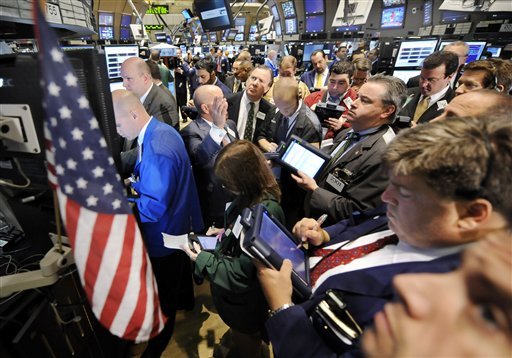Investors agonizing over a faltering economy sent the stock
market plunging all over again Wednesday after a disheartening
retail sales report convinced Wall Street that a recession, if not
already here, is inevitable.
TIM PARADIS – Associated Press Business
NEW YORK
Investors agonizing over a faltering economy sent the stock market plunging all over again Wednesday after a disheartening retail sales report convinced Wall Street that a recession, if not already here, is inevitable. The Dow Jones industrials dropped as much as 515 points, more than half their huge 936-point advance from Monday, and all the major indexes fell at least 5 percent.
The government’s report that retail sales plunged in September by 1.2 percent – almost double the 0.7 percent drop analysts expected – made it clear that consumers are reluctant to spend amid a shaky economy and a punishing stock market. The Commerce Department report is sobering because consumer spending accounts for more than two-thirds of U.S. economic activity. The reading comes as Wall Street is beginning to refocus its attention on the faltering economy following stepped up government efforts to revive the stagnant credit markets.
“Even though the banking sector may be returning to normal, the economy still isn’t. The economy continues to face a host of other problems,” said Doug Roberts, chief investment strategist at ChannelCapitalResearch.com. “We’re in for a tough ride.”
Federal Reserve Chairman Ben Bernanke offered a similar assessment, warning in a speech Wednesday that patching up the credit markets won’t provide an instantaneous jolt to the economy.
“Stabilization of the financial markets is a critical first step, but even if they stabilize as we hope they will, broader economic recovery will not happen right away,” he said in prepared remarks to the Economic Club of New York.
Analysts have warned that the market will see continued volatility as it tries to recover from the devastating losses of the last month, including the nearly 2,400-point plunge in the Dow over eight sessions. Such turbulence is typical after a huge decline, but the market’s anxiety about the economy was also expected to cause gyrations expected in the weeks and months ahead.
Investors apparently have come to believe that Monday’s big rebound, a response to the government’s plan to invest $250 billion in banks to get the lending business restarted, was based on too much optimism about the country’s problems.
Doubts about the economy were already surfacing in Tuesday’s session, when investors halted an early rally and began collecting profits from stocks’ big Monday advance. Wednesday’s data confirmed the market’s fears that the economy is likely to remain weak for some time, and that corporate profits are likely to suffer.
Mark Coffelt, portfolio manager at Empiric Funds in Austin, Texas, said moves by European and U.S. government officials to begin investing directly in banks are easing worries about credit. But the steep pullback in stocks that began last month after the credit markets lurched to a near standstill has now created worries that consumers will spend less after seeing the value of their retirement accounts and other investments drop.
“Markets abhor uncertainty and so we got a lot of that resolved this weekend and we got the reward Monday but now people are saying ‘OK, now what is the economy going to do?'”
“We’re definitely going to get a slowdown from the terror of going through that,” Coffelt said.
In mid-afternoon trading, the Dow fell 487.92, or 5.24 percent, to 8,823.07 after falling more than 515 points.
Broader stock indicators also skidded. The Standard & Poor’s 500 index fell 63.49, or 6.36 percent, to 934.52, and the Nasdaq composite index fell 96.05, or 5.40 percent, to 1,682.96.
With Wednesday drop likely to hold, the Dow will, after a one-day break, resume a string of triple-digit losses or gains. On Tuesday, after swinging erratically throughout the session, the blue-chip index closed the day down a moderate 76 points.
The stock market is struggling to recover from last week’s terrible run, which erased about $2.4 trillion in shareholder wealth and brought the Dow to its lowest level since April 2003. The tumble occurred amid a seize-up in lending stemming from a lack of trust among institutions in response to the bankruptcy of investment bank Lehman Brothers Holdings Inc. and the failure of Washington Mutual Inc., which had been the nation’s largest thrift.
The credit markets have been showing tentative signs of recovery, though they remain strained, and demand for safe assets remains high. The three-month Treasury bill on Wednesday was yielding 0.33 percent, up from 0.30 percent on Tuesday. Overall yields remain low, showing that demand is so high that investors are willing to earn meager returns as long as their principal is preserved.














